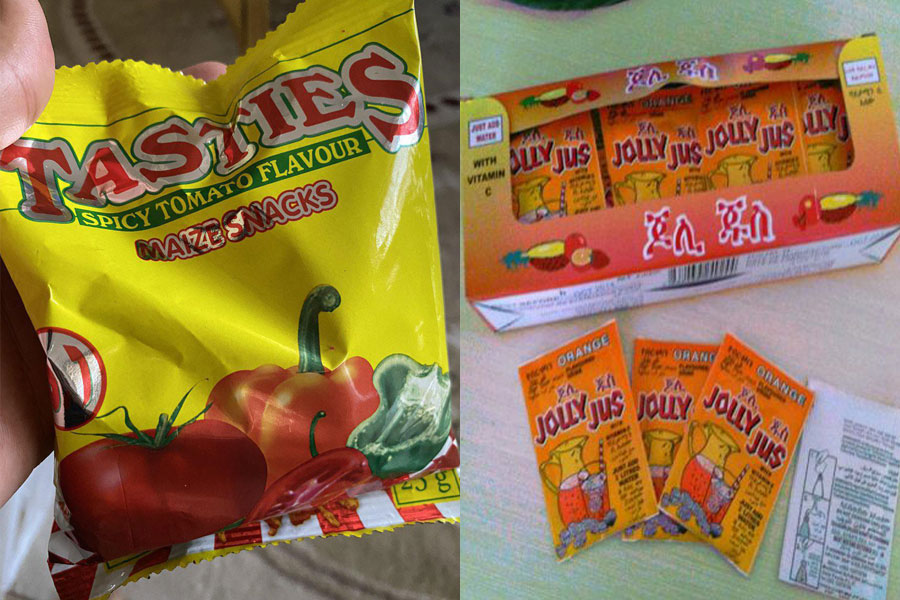
View From Arada | Dec 04,2022
Aida Tadesse, 38 years old and founder of Aidesho's Design, has loved drawing pictures and painting since her childhood. She sketches, draws and paints creative designs on every possible surface, constantly improving her talent.
However, a decade ago she officially started to demonstrate her creativity. She went to Next Fashion Design College and graduated with great distinction. With the skills she acquired from school, she participated in fashion shows and organised many of her own.
To take her career to the next level, she joined Addis Abeba University School of Commerce in 2001 for two years to study office management and secretarial science.
Aida continued to practice. She kept on watching online videos and reading books and articles about fashion design and modelling. She also went to New Delhi, India, in 2013, winning a scholarship to study entrepreneurship for small business development.
She became interested in African patterns that represent the culture and art of countries across the continent and went to Uganda for fashion design training. She took a number of short courses online. Six years ago she took the ultimate step and founded her own company, Aidesho’s Design.
Her company, which uses hand-woven cotton, makes clothes with African designs, buying 25pc of the inputs from abroad.
“I always wanted to make African traditional clothing in casual and modern styles,” said Aida.
Aidesho makes textiles and fashionable shoes with African print accessories for weddings, parties and everyday streetwear. Aida’s customers are mainly members of the diaspora, diplomats based in Addis Abeba, young people and artists. The company operates with five employees and sells 30 items of clothing a month.
Betelhem Gizachew, 24, is one of the many young people who is passionate about African patterns. She tends to buy African prints since she likes clothes that are bright and colourful.
"I used to be challenged to find clothes that fit my preference and size," she said.
Nine months ago Betelhem went to a garment Bazar held in Mesqel Flower. She saw various garments with interesting African patterns. She ended up buying a colourful dress and a pair of trousers.
"I found them quite special," she said.
Since then, Betelhem has tended to buy most of her clothes with African prints. Betelhem now buys her clothes specially designed, choosing the specific pattern and size of her order.
Betelhem's friends are also starting to follow the trend and helping to turn "niche" into "must-have".
Even though these products are getting attention from users, Aida says business has been slow since the onset of the Novel Coronavirus (COVID-19). The demand for her products has sharply fallen.
As an option to stay afloat, Aidesho’s Design repurposed its production line to make washable face masks with African prints. It is making 200 to 300 cotton face masks a day and sells them mainly to the diaspora community. It has already started exporting its products to London and is in the process of arranging shipping to Canada, according to Aida.
There is a huge demand potential for its creative products, according to Aida.
Sarah Negussie, a 28-year-old health officer by training, is another entrepreneur that works on designs with African patterns. Passionate about art since the sixth grade, Sarah has been working on fashion since she was a college student.
“After I finished medical school," she said, "I decided to go to fashion school to make my dream happen.”
Two years ago, she started her business in her house by making small crafts and jewellery and selling them through friends and shops. She also works with designers and artists.
Sarah says that she used to face challenges finding clothes that fit her, which damaged her confidence.
“I wanted to create an environment in which women have many options for fashionable clothes that fit them,” she said.
This led her to establish Sarah Design, her own fashion line. She has opened two shops, named Sabege and Mender, to sell her products.
Sarah Design makes jewellery and clothes. Sarah is working in collaboration with local garment makers Maebel Traditional Dress and Tirur Apparel to expand her business.
She gets the fabric and the accessories from Merkato and Shiromeda. She also sells her products at Saturday and Sunday markets and recreation centres such as Green Day Spa and Ibex Hotel.
Bethlehem Abebe, who says she is influenced by African literature, also established Zewd Design three years ago. Her business had one employee at first and produced garments for men and women.
“Thus, I have become very interested in African traditional clothing and fashion design,” she said.
Established with 30,000 Br in startup capital, the company now has five full-time employees and makes apparel accessories with African designs.
Bethlehem imports textile materials from various African countries. Her products are mainly consumed by members of the diaspora, staff members of the African Union and other international organisations.
Due to the market disruption and business slowdown caused by the pandemic, Zewd Design is currently producing colourful face masks.
In addition to the clothes and shoes, small businesses that print African designs on different materials are proliferating throughout the city. Nor Furniture, which makes furniture equipment with these patterns, is one such company.
Founded and owned by Eskindir Getachew and his American wife, Elizabeth Norah, Nor, which literally means "have a seat," has made house furniture since October 2019. The owners import wax prints from Tanzania, Kenya, Mali and Nigeria and use local wood to produce furniture accessories. Nor started operations with 50,000 Br of initial capital and was originally based at the founders' house.
“The entrepreneurial idea was from my partner since she was in Kenya,” where African prints are widely produced, said Eskindir.
The owners started promoting their company via social media platforms. Soon after, they began to receive calls and visits.
“Local consumption for our products is very low,” said Eskindir, explaining that most Ethiopians are interested in casual or local styles.
About 70pc to 80pc of Nor's customers are members of the diaspora, visitors and ex-pats. It sees three customers a week who mostly buy full furniture sets.
But over the past five months, Nor’s local consumption increased by five percent, according to the co-owner.
“We've received many customers, relatively more than before,” he said.
Nor Furniture, which now employs seven people, is preparing to export its products. The firm is expecting to train 100 to 150 weavers this year to produce the inputs locally, according to Eskindir.
The fashion industry in general and African designs in particular have huge potential if well-developed, according to Meskerem Mitiku (PhD), assistant professor of management and entrepreneurship at Addis Abeba University.
"The fashion design enterprises should work on creative designs," said Meskerem, who argues that design duplication has been challenging the industry. "These businesses should also work toward exporting their products since the local market is insufficient."
Meskerem urges the government to help these small-scale fashion design businesses in terms of facilitating access to finance, training, and creating a market chain.
“The industry is capable of creating many jobs, because it involves many people in the value chain, from cotton production to sales,” she said.
PUBLISHED ON
Oct 03,2020 [ VOL
21 , NO
1066]

View From Arada | Dec 04,2022

Commentaries | Mar 12,2022

Agenda | Nov 20,2021

In-Picture | Oct 26,2019

Fortune News | Dec 23,2023

Fortune News | Feb 22,2020

Radar |

Viewpoints | Jul 13,2019

Commentaries | Jul 13,2019

News Analysis | Aug 28,2021

Dec 22 , 2024 . By TIZITA SHEWAFERAW
Charged with transforming colossal state-owned enterprises into modern and competitiv...

Aug 18 , 2024 . By AKSAH ITALO
Although predictable Yonas Zerihun's job in the ride-hailing service is not immune to...

Jul 28 , 2024 . By TIZITA SHEWAFERAW
Unhabitual, perhaps too many, Samuel Gebreyohannes, 38, used to occasionally enjoy a couple of beers at breakfast. However, he recently swit...

Jul 13 , 2024 . By AKSAH ITALO
Investors who rely on tractors, trucks, and field vehicles for commuting, transporting commodities, and f...

Sep 27 , 2025
Four years into an experiment with “shock therapy” in education, the national moo...

Sep 20 , 2025
Getachew Reda's return to the national stage was always going to stir attention. Once...

Sep 13 , 2025
At its launch in Nairobi two years ago, the Africa Climate Summit was billed as the f...

Sep 6 , 2025
The dawn of a new year is more than a simple turning of the calendar. It is a moment...